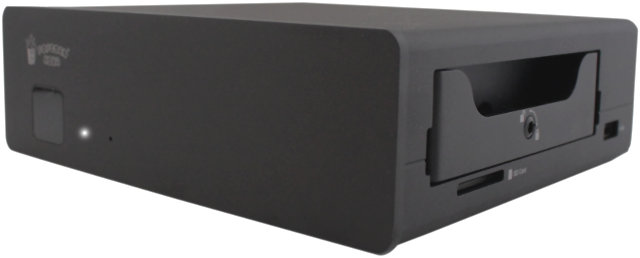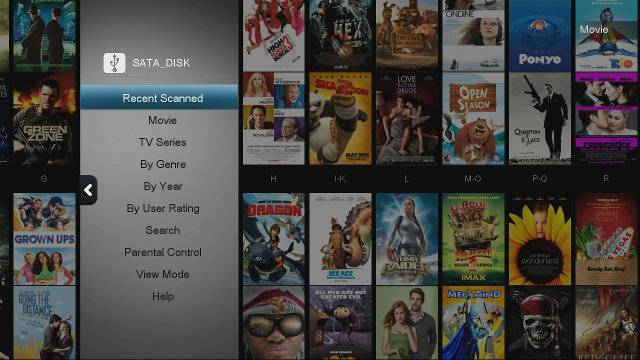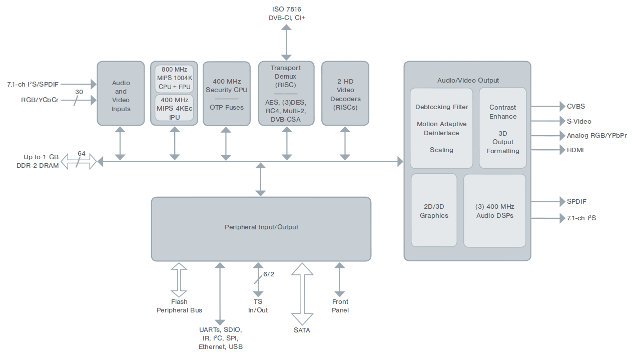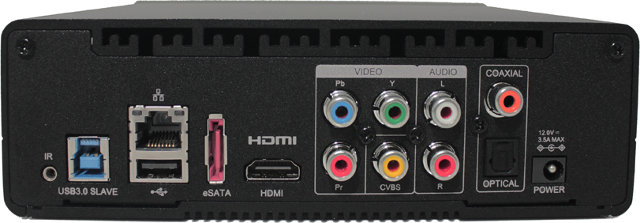CloudMedia, previously known a Syabas, has announced the available of Popcorn Hour A410, a networked media jukebox (NMJ) powered by Sigma Designs SMP8911 dual core processor with 1GB RAM, Gigabit Ethernet, support for 2.5″ and 3.5″ SATA drives, USB 3.0, and numerous audio / video ports. It can be used as a media player, as well as a NAS (Networked Access Storage).
 Popcorn Hour A410 specifications:
Popcorn Hour A410 specifications:
- SoC – Sigma Designs SMP8911 Dual-Core 800Mhz processor (MIPS) with 512KB L2 Cache and VXP Video Processor
- System Memory – 1024MB DDR2
- Storage – 256MB SLC NAND Flash, SD Card reader, 2.5″ and 3.5″ SATA HDD bay, and eSATA connector.
- Audio/Video I/Os – HDMI, Component, CVBS, Stereo Audio, optical and coaxial S/PDIF.
- Audio DAC – ESS Sabre Audiophile class DAC (24-bit, 192 Khz sampling rate)
- Video containers – MPEG1/2/4 Elementary (M1V, M2V, M4V),MPEG1/2 PS (M2P, MPG, DAT, VOB),MPEG2 Transport Stream (TS, TP, TRP, M2T, M2TS, MTS),AVI, ASF, WMV, Matroska (MKV),MOV (H.264), MP4, RMP4, 3D BD ISO
- Video Decoders – XVID SD/HD,MPEG-1, MPEG-2 MP@HL, MPEG-4.2 ASP@L5, 720p, 1-point GMC, MPEG-4.10 (H.264) : BP@L3, MP@L4.0, HP@L4.0, HP@L4.1,WMV9 : MP@HL,SMPTE 421M (VC-1) : MP@HL, AP@L3
- Audio Containers – AAC, M4A,MPEG audio (MP1, MP2, MP3, MPA),WAV, WMA, FLAC, OGG
- Audio Decoders – DTS, WMA, WMA Pro,MPEG-1 Layer 1, 2, 3, MPEG-4 AAC-LC, MPEG-4 HE-AAC, MPEG-4 BSAC ,LPCM, FLAC, Vorbis, TrueAudio, APE Audio
- Audio Passthrough – DTS, DTS-HD HR, DTS-HD MA
- USB – 2x USB 2.0 Host, 1 x USB 3.0 Slave
- Connectivity – 10/100/1000M Ethernet
- Misc – Power and Standby LEDs, IR sensor
- Power Supply – 12V DC, 3.5A Max
- Power Consumption – Typical: 15W, Max: 40W.
- Dimensions – 182mm (W) x 158mm (L) x 56mm (H)
- Weight – 1.3 kg
- Casing – Aluminum case designed by Silverstone , fanless Operation
The box comes with a remote Control and corresponding two AAA batteries, several cables (HDMI, eSATA, and USB 3.0 slave), one HDD dock key, foud HDD dock screws, an AC power adapter, a quick start guide, and a warranty card.
Several network protocols are supported namely Bonjour, UPnP SSDP, UPnP AV, Windows Media Connect, Windows Media Player NSS, Samba, NFS, BitTorrent P2P, and Usenet downloader. It can be access as a NAS via SMB, NFS, or FTP.

The user interface is said to be customizable with shortcuts and a background that changes according to the time of the day, and Network Media Tank Jukebox (shown above) is pre-installed in the box. An Android and iOS app called NMJ navigator can freely be downloaded and installed in order to control your device via your smartphone or tablet.
Sigma Designs SMP8911 is a secure media processor with two main MIPS cores @ 800MHz, one more MIPS core @ 400MHz for image processing, a security core @ 400MHz, three DSPs @ 400MHz, a 2D/3D graphics processing unit, and more.

You can read more details about the processor on my earlier coverage of SMP8910 / SP8911, or on Sigma Designs SMP8910 page.
For further information and/or pre-order the device for $259, visit Popcorn Hour A410 page. Shipping is expected on the 10th of January. Since A410 is an upgrade of the previous A400 NMJ with more RAM, and the Audio DAC, you can also check out A400 user’s manual, and visit networkedmediatank.com forums.

Jean-Luc started CNX Software in 2010 as a part-time endeavor, before quitting his job as a software engineering manager, and starting to write daily news, and reviews full time later in 2011.
Support CNX Software! Donate via cryptocurrencies, become a Patron on Patreon, or purchase goods on Amazon or Aliexpress






There a review of Popcorn Hour A400, the earlier model, which also appears to have an older user’s interface.
http://www.youtube.com/watch?v=Ujk2IQcDlqw
According to the review, the device is very good for playing high bitrate video files (Bluray rips to MKV) from your home network, but it’s basically useless for Internet video due to the lack of apps such as Netflix and others. But commenters mentioned the reviewer forgot to test many functionalities of the device: NMJ navigator app, jukebox app, SATA HDD support, audio pass-through…
MIPS.. haha
The video decoders on the Simga chips are still better than most other Arm chipsets though that gap has closed significantly.
It’s a pity Sigma Designs didn’t switch to Arm and they don’t seem to be even updating their chipsets any more.
All I can see on the A-410 is a newer UI, I wonder is it still Flash based (which was not smooth) or have they ditched Flash for something else.
The Popcornhours are the last of a dying breed, the boutique media player, XBMC/Android has killed most of them off.
Is it or can it be rooted and will it run XBMC?
Team XBMC was porting it to Sigma Designs MIPS SoCs, but there has not been any news about that porting process for about a year now.
Last info on XBMC from Sigma Design
http://www.sigmadesigns.com/uploads/library/press_releases/120828.pdf
Last news on MIPS from XBMC
http://xbmc.org/xbmc-port-from-sigma/
More info on XBMC forums
http://forum.xbmc.org/showthread.php?tid=112159
Cloud Media likely would not sanction XBMC on the PCH running unless it was their own version of it.
I think Sigma are in trouble as a company, the XBMC port they showed looked to be fully featured at the time but they haven’t been releasing any new products other than a few home automation chips.
Sigma made their money in selling linux based MIPS chips to TV set top boxes and media players like the PCH, Arm vendors have been eating away at that.
Western Digital is Sigma’s biggest customer with the WDTV Live but for how long… if WD release an AndroidTV box in the future then Sigma are toast.
@Dan
Sigma has been losing money for a while, and last year, they closed their Hong Kong office. Their chips are too expensive now.
Sigma Designs winning point before was that they legally licensed all video and audio codecs in bulk and bundled those with the price of the SoC chip, which is why the price is higher, and the price of similar ARM or MIPS chips from competition would be priced just as high if they included legal license bundles for codecs.
Now you have all Chinese companies making SoCs whose VPU can decode all popular codecs but no license is included in the price, yet they provide a SDK that include everything and let the buyers sort out codec licecing on their own, how most Chinese media player manufacturers either don’t know or don’t case about licenses.
Many western companies do not either know about this fact and simply forget to license all the codecs that they activate on their products.